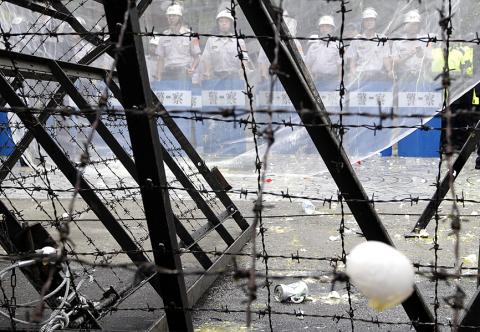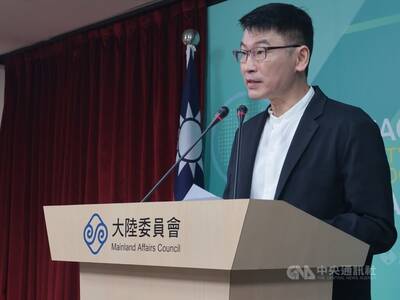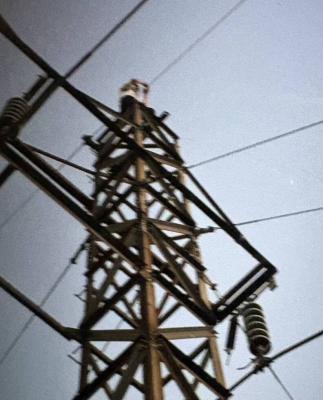Thousands of people involved in the poultry industry nationwide braved the rainy weather yesterday to protest outside the Council of Agriculture in Taipei against the council’s order that chickens must be electronically slaughtered in certified slaughterhouses. The demonstrators said the new policy threatens their livelihoods.
Some of the protesters held banners accusing the government of “forcing the people to revolt,” while others threw rotten eggs, water bottles and flag poles at the council building — and the police deployed to guard it.
“I have five people to feed in my family with my small chicken farm, but now that traditional slaughtering is banned, I have to travel two hours back and forth to take the chickens to certified electrical slaughterhouse in Fengshan District (鳳山), Greater Kaohsiung. Sometimes the dead chickens go bad on the return trip, especially in the summer heat,” a farmer who identified himself as A-ching (阿清) from Kaohsiung’s Meinong District (美濃) told the crowd.

Photo: Pichi Chuang, Reuters
“Sometimes the slaughterhouse refuses to take my order, since it only starts the machine when there are at least 500 chickens,” she said.
A-ching said her business has been seriously affected since the order was imposed on May 17.
“What am I going to do to feed my family if I cannot make a living anymore?” A-ching said. “Are you going to feed my family, President Ma Ying-jeou (馬英九)?”

Photo: Pichi Chuang, Reuters
The crowd responded with a round of applause and airhorn blasts.
Taiwan Rural Front spokeswoman Frida Tsai (蔡培慧) said that while Council of Agriculture Minister Chen Bao-ji (陳保基) has repeatedly said the 83 certified poultry slaughterhouses nationwide were enough to meet demand, “it was a total lie.”
“The Poultry Association recently telephoned each of the 83 slaughterhouses for a poll. Only 47 provide slaughtering services for non-associated chicken farmers,” Tsai said.
Lee Wen-yang (李文揚), the second-generation owner of a popular poultry shop in Taipei’s Nanmen Market (南門市場) founded by his parents 50 years ago, said the capacity of the slaughterhouses was not sufficient to meet demand.
“My shop opens at 6am, but the poultry slaughterhouse is so jammed that often we cannot get our chickens until noon, and by that time the shopping crowd is gone,” Lee said. “The [slaughterhouse’s] quality of service is poor too. My mother and I have to spend a lot of time cleaning the chickens before putting them on shelf.”
The unequal distribution of the slaughterhouses around the country was also an issue, the protesters said, because there is only one certified electrical poultry slaughterhouse for Taipei and New Taipei City (新北市), which have a combined population of more than 6 million people.
There were minor clashes between the demonstrators and police, with the protesters pushing at police barricades.
Council of Agriculture Deputy Minister Wang Cheng-teng (王政騰) met with a 10 representatives from the protesters, but the two sides were not able to reach an agreement. After the meeting, the demonstrators marched to the Presidential Office for another protest.

‘ANGRY’: Forgetting the humiliations and sacrifices of ‘the people of the Republic of China’ experienced disqualified Lai from being president, Ma Ying-jeou said Former president Ma Ying-jeou (馬英九) yesterday criticized President William Lai (賴清德) over what he called “phrasing that downplayed Japan’s atrocities” against China during World War II. Ma made the remarks in a post on Facebook on the 80th anniversary of the end of World War II. Ma said he was “angry and disappointed” that Lai described the anniversary as the end of World War II instead of a “victory in the war of resistance” — a reference to the end of the Second Sino-Japanese War (1937-1945). The eight-year war was a part of World War II, in which Japan and the other Axis

The Mainland Affairs Council (MAC) yesterday announced a ban on all current and former government officials from traveling to China to attend a military parade on Sept. 3, which Beijing is to hold to mark the 80th anniversary of the end of the Second Sino-Japanese War. "This year marks the 80th anniversary of the end of World War II and the Republic of China’s victory in the War of Resistance [Against Japan]," MAC Deputy Minister and spokesperson Liang Wen-chieh (梁文傑) told a regular news briefing in Taipei. To prevent Beijing from using the Sept. 3 military parade and related events for "united

‘OFFSHORE OPERATIONS’: Also in Dallas, Texas, the Ministry of Economic Affairs inaugurated its third Taiwan Trade and Investment Center to foster closer cooperation The 2025 Taiwan Expo USA opened on Thursday in Dallas, Texas, featuring 150 Taiwanese companies showcasing their latest technologies in the fields of drones, smart manufacturing and healthcare. The Taiwan External Trade Development Council (TAITRA), the event’s organizer, said the exhibitors this year include Hon Hai Precision Industry Co (Foxconn), the world’s largest contract electronics manufacturer; AUO; PC brand Asustek Computer; and drone maker Thunder Tiger. In his opening speech, TAITRA chairman James Huang (黃志芳) said he expected Texas to become a world-class center for innovation and manufacturing as US technology companies from Silicon Valley and Taiwanese manufacturers form an industrial cluster

A 20-year-old man yesterday evening was electrocuted and fell to his death after he climbed a seven-story-high electricity tower to photograph the sunset, causing a wildfire on Datong Mountain (大同山) in New Taipei City’s Shulin District (樹林), the Taoyuan Police Department said today. The man, surnamed Hsieh (謝), was accompanied on an evening walk by a 20-year-old woman surnamed Shang (尚) who remained on the ground and witnessed the incident, capturing a final photograph of her friend sitting atop the tower before his death, an initial investigation showed. Shang then sought higher ground to call for help, police said. The New Taipei